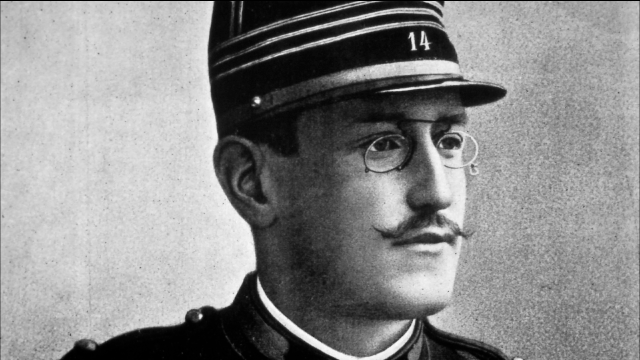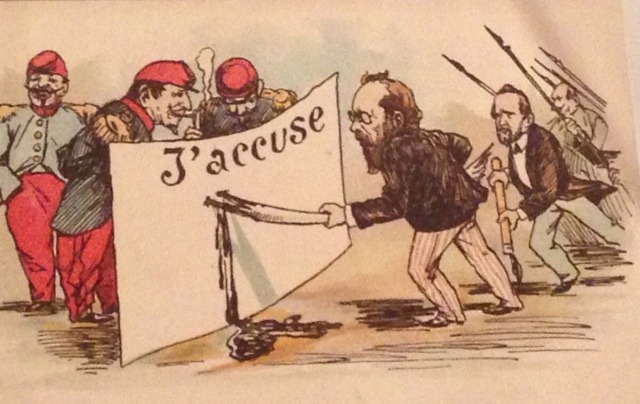A friend recently wrote an essay for Time magazine on the cholera outbreaks in France in the 1830s.
The piece is a good reminder that problems we experience today, though they may feel unique and once-in-a-lifetime, generally have similar antecedents in both recent history and ancient times.
Plagues are a recurring feature of human existence. Each has its own color, its particular variations on death and suffering. But there are also broad similarities, including the tendency of plagues to inflame tensions between rich people and poor.
However, what this same writer, Yale professor Maurice Samuels, is better known for — and what I want to discuss here — is his study of anti-Jewish sentiments and ideology in 19th-century France. That too seems relevant, unfortunately, to the current moment.
I was startled several years ago by a particular chant from the Charlottesville protests — Jews will not replace us!
It struck me as an odd, paranoid fear — being “replaced” by Jews — a fear which not only lacked reasonable basis, but which stuck out thematically. At the time President Trump was specifically stoking fears about other groups, namely immigrants from Central America and Muslim-majority countries.
White supremacy is white supremacy, I suppose. Once you tap the vein, you’re likely to get all the variations — anti-black, antisemitic, anti-Muslim, anti-Hispanic. On the other hand, the increasing willingness of white supremacists to voice their ideology loudly and publicly seems like a singularly bad sign for the U.S., a bellwether for a nation starting to careen out of control.
In France in the 1800s, there was cause for Jews to feel not just hopeful, but exhilarated. France was the first nation in modern Europe to grant Jews the full rights and privileges of citizenship. Other countries were still strictly limiting where Jews could live, what jobs they could hold, what kind of clothes they had to wear, what oaths they had to swear. Jews generally could neither vote nor own land. (And these highly discriminatory laws were an improvement, compared to earlier eras in which countries such as England, France, Germany, Spain, and Italy ordered the expulsion of Jews.)
But as excited as French Jews were about the new opportunities for advancement in the 1800s, there were periodic outbreaks of deep hostility toward Jews.
One was triggered by the betrayal of a beloved duchess in 1832 by her (formerly) Jewish confidant.
Another was the so-called Dreyfus Affair in 1894, in which a Jewish officer in the French military was falsely accused of treason and sentenced to life imprisonment.

Alfred Dreyfus
The Dreyfus trial riveted France in a way similar to the O.J. Simpson trial 100 years later in the U.S. There was heavy press coverage, there were extreme passions on both sides. The crisis widened cracks which had already started to form in French society.
The case also stirred intense antisemitism. If the Holocaust in the 1940s was the most horrific expression of anti-Jewish ideology in modern history, the Dreyfus Affair was a signpost along the way.
It’s easy for historians to see the significance of the Dreyfus Affair now, 125 years later. But I am intrigued and impressed by people who were able to grasp its meaning at the time.
In France, one such man was Bernard Lazare. Though Jewish by birth, he wasn’t particularly religious. However, he was interested in how disadvantaged groups were treated, whether low-wage miners in southern France or the Jewish military officer wrongly convicted of treason.
Lazare wrote extensively about the Dreyfus case as it unfolded. Indeed he was the first to use the phrase J’accuse toward Dreyfus prosecutors, a phrase later made famous by the French writer Emile Zola.
Whatever the opposite of “winning friends and gaining influence” is, that’s what Bernard Lazare was doing most of his adult life. He was a contrarian and a blunt truth-teller. He frequently wound up splitting from people who probably should have been allies. He was, in all likelihood, a giant pain in the ass to be around.
He publicly denounced Karl Marx as “a jealous authoritarian, unfaithful to his own ideas.”
He wrote a letter to former friend Theodor Herzl which included this light, breezy line: “You are bourgeois in thoughts, you are bourgeois in your feelings, you are bourgeois in your ideas, you are bourgeois in your conception of society.”
Always fun to get a letter from Bernard!

Bernard Lazare
But here’s the thing. As annoying and uncompromising as he was, Lazare was right about the Dreyus Affair and what it portended.
And he was looking beyond France, too. He was traveling abroad and writing about the mistreatment of Jews in Russia, and of Armenians in Turkey. For example, when a Jewish organization made nice with the sultan of the Ottoman Empire, Lazare unloaded on the group. He pointed out that the Ottoman Turks were targeting Armenians the same way other countries were mistreating Jews. He asked why Jews, of all people, would praise the Turkish sultan:
Representatives of the oldest of persecuted peoples, whose history cannot be written, but in blood, send their salutations to the worst of assassins.
When a disadvantaged group, or a new immigrant group, is first granted rights and privileges, there are often tensions within the group about how to assimilate. Some are in a rush to put aside their minority identity, blend in with the host nation, and start earning money and security. Others are wary of blending in, fearing that it dilutes religious observance and group cohesion.
French Jews were no exception to such tensions. But Lazare came to believe during the Dreyfus Affair that speaking up loudly and immediately was imperative. He correctly surmised that the anti-Jewish hostilities on display in the Dreyfus drama were leading somewhere dangerous and that looking the other way — though tempting for wealthy, assimilated Jews — was a recipe for disaster.
Antisemitism is a problem which stretches back thousands of years. It ebbs and flows. It also changes shapes. In the old days, Jews were scorned as backward and retrograde, as clannish, dirty nomads. Now they get accused of owning all media, running the world, building intricate global conspiracies.
I was taken aback during a visit to Armenia two years ago when a resident took me aside to say that the Armenian Genocide, during which Turkish forces killed up to 2 million Armenians from 1915 to 1918, was actually the idea of Jews. She claimed that Jews were hoping to displace Armenians as the favored minority among Turkish ruling classes.
There is no evidence for such a theory. It’s a figment of antisemitic imagination. And yet the theory persists. I was later given a version of the same argument by an Armenian friend in Los Angeles.
It’s hard not to feel troubled by such moments. The historical truth is that prominent Jews such as Lazare and then-U.S. Ambassador to the Ottoman Empire Henry Morgenthau Sr. were sounding the alarm about impending atrocities against Armenians.
It’s hard not to feel discouraged that anti-Jewish animus is bubbling up yet again in the United States. It’s hard to know even where to start when the shouted chant is absurd on its face — Jews will not replace us!
But it gives me hope to learn about people like Bernard Lazare, people who were courageous and uncompromising during dark moments in world history.
It gives me hope, too, to learn about contemporary examples of everyday courage, whether it’s my Armenian mother-in-law or friends, lawyers, and journalists speaking up for wrongly convicted Curtis Flowers in Mississippi.
People who have the guts to stand up and speak truth give me a model to aim for and aspire to, even as our world seems to flirt with another go-around with totalitarianism.
Lazare died of cancer at age 38. Perhaps he sensed he would not live long, and this intuition helped drive his intensity and outspokenness.
But the truth is, none of us know how long we live. None are guaranteed tomorrow. So why not speak the truth today, while we have the opportunity?

Thank you for speaking up and calling out truths.
the truth is, none of us know how long we live. None are guaranteed tomorrow. So why not speak the truth today, while we have the opportunity? Yes, yes, yes, knowing I might be gone tomorrow I don’t want to waste today. It gives me courage to speak up about Jesus Christ and a few other things I believe strongly in. You post encouraged me, thank you.
Brilliant 👍👍👍
Thank you!
“jews will not replace us” a pernicious phrase that inspired my favorite joke.